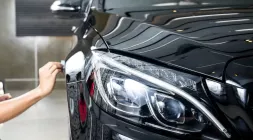Reasons Your Car Vibrates When Accelerating
A common sign that your vehicle isn’t at its best is when the vehicle vibrates while you’re accelerating
Every car owner cares for his vehicle to a certain degree. While some may treat their vehicle as if it were a precious heirloom, some are okay with seeing it just “fine.” But regardless of which group you belong to, we’re sure you care enough for your car to make sure it’s in great shape.
That’s why if there are signs that your vehicle isn’t at its best, you’re sure to notice. These signs may not exactly affect the looks and aesthetics of your vehicle. But it will certainly affect how it performs. A common sign is when the vehicle vibrates while you’re accelerating.
While this may not be noticeable at first, the problem can get a lot worse. Over time, the vibrations can get so strong that it would be impossible to ignore it. But what exactly causes these vibrations? How do they happen? What can you do to fix it? Get all the info you need to know about it in this article from Philcarnews.com.
Vibrations and the your vehicle
If your vehicle is accelerating and it vibrates, this could be caused by a variety of issues. In most cases, vehicle vibrations are simple issues that come out as an indicator of a bigger problem. If left to last for longer, the root problem could triple in damage and in repair cost.
Car shakes and vibrations while driving is different from a vehicle that vibrates when at rest. That suggests that you need to pay attention as to when the vibrations happen. Does your vehicle vibrate when at idle? Is your vehicle vibrating at low speed, at high or at a constant speed? If your vehicle shakes only at times when you press on the brakes, the cause could also be different. Confused? Here is our tip on how you should take on this situation.

If your vehicle is accelerating and it vibrates, this could be caused by a variety of issues.
Possible Causes Why Your Car Is Vibrating
1. Damage on the Inner CV Joint
The CV joints can be found at each axle’s end. There is an inner and outer joint that you should be aware of. When the inner joint of the CV starts to fail or is damaged, you’ll notice that your car is vibrating under heavy acceleration. If you let the problem get worse, these minor vibrations can turn to violent shakes when put under load.
CV joints that are damaged usually happen due to tears in the system’s joint boot. If this happens, dirt and water can freely enter the boot. This will contaminate the grease that serves as a protection for the splines inside. If there’s no proper lubrication, the metal-on-metal contact can eventually cause failure. The only remedy here would be to re have the CV joint replaced.

CV joints that are damaged usually happen due to tears in the system’s joint boot
2. Motor Mounts are Broken
The sole purpose of your motor mounts is to keep the car engine in place attached to the vehicle frame. This, however, also has a secondary purpose. That is to reduce (or dampen) the engine vibration. This is so that the vehicle’s occupants don’t feel the vibrations and shakes of the engine when running
Engine mounts are crafted from a hard rubber material. This allows it to absorb the vibrations effectively. Whenever motor mounts are broken or damaged, it won’t only cause vibrations in your vehicle. The other parts of the systems in your vehicle can also get misaligned. If further ignored, this can ultimately break because the engine is no longer in its correct position.
You will find that it’s easy to feel a defective motor mount when it’s idling. The shaking and vibrations are more obvious when under acceleration since the engine works harder. Also, keep in mind that broken motor mounts tend to divert the load to the other mounts. This also leads those other mounts to fail and break down as well.
>>> Related: Car Owners: Never Ignore Brakes and Tires

The sole purpose of your motor mounts is to keep the car engine in place attached to the vehicle frame
3. Unbalanced Tires
If you had new tires recently installed and noticed your vehicle shakes, this could be caused by unbalanced tires. When a single tire is mounted onto your vehicle, it won’t have the same weight all around. This isn’t a big issue however and can be easily addressed by a professional.
To fix it, the tire installer would need to mount the wheel and tire assembly on his balancing machine. Then, he would need to stick on some small wheel weights onto the rim. This is attached to specific locations so the balance is maintained perfectly. As your tire rotates, slight weight imbalances will turn into small vibrations.
At higher speeds in which the tire rotates faster, the vibrations will also become more noticeable. At this rate, your steering wheel may even begin to shake.
If your vehicle vibrates while you are driving at a constant speed, you have an unbalanced tire or tires. This could also be the case if the vibrations get worse as you speed up. It can also be possible that one of your adhesive wheel weights could have possibly fallen off. To fix this, simply take your vehicle back to your local tire shop. Then, let the tire guy rebalance your rubbers for you.

If you newly installed tires and noticed your vehicle shakes, this could be caused by unbalanced tires
4. Loose Lug Nut
A more simple problem that’s more common than people think is possibly loose lug nuts. If your wheel’s lug nuts aren’t torqued down properly on the hub, the wheels may wobble.
This wobbling motion could be ever so slightly that you won't notice. However, it could also be so off the top that you can lose control of your ride. If you do happen to have a loose lug nut in your hands, your vehicle will shake.
>>> Related: 5 telltale signs indicating the need to replace the damper

A more simple problem that’s more common than people think is possibly loose lug nuts.
If these are left untightened, these may just loosen fully and your wheel could literally fall off. Of course, you wouldn’t want that to happen at all. To prevent that from happening, make sure you’re using the right lug nut size for compatibility.
To make sure that your lug nuts aren’t loose, make use of a torque wrench. Use this to tighten every lug nut according to the factory specs. If you don’t have access to a torque wrench, you can also make use of a tire iron. An ordinary lug nut wrench will also do the job.
RECENT ARTICLES









